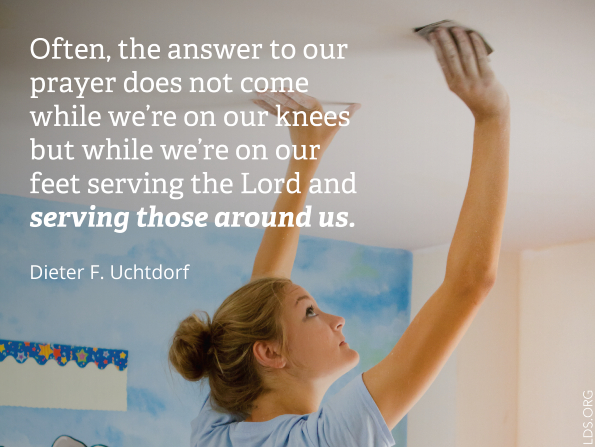That second word was used by a member from Ghana as he answered a question I posed and explained his view on the ministering program. In the old system, the emphasis in his mind in his work as a home teacher was on scheduling. "Can I get my schedule to align with my assigned families' schedules so that I can get into their home and visit them?" The difficulties of scheduling to get into a home were a major part of home teaching for many of us. Now that's a much smaller issue. The emphasis is on what we can do to help and to be friends. Ministering can include visiting, but it can also include meeting for lunch, going to an activity together, talking on the phone, sending an inspirational thought, spending time praying for the welfare of others and thinking of creative ways to help, etc. For a great discussion of what ministering looks like, see the inspiring talk of Jean B. Bingham from the April 2018 General Conference, "Ministering as the Savior Does."
Whether you can successfully make a visit before midnight of the last day of the month is a non-issue now. The only real issue is ministering. Less structured, more flexible, and more loving. Scheduling is no longer the key. A subtle difference, but crucially important.
My wife points out that visiting teaching was also highly centered around scheduling. In fact, the issue of scheduling was often at the forefront in selecting assignments for visiting teachers. The scheduling issue revolved around evaluating whether groups of sisters were free during the day or only free during the evening or weekends in order to make appropriate matches based on the potential for overlapping schedules that could permit visits. But now that the scheduling of visits is less important, leaders and members may be more free and more creative in making assignments and in making ministering work to really bless lives and not just foster visits. Yes, visits are still important and desirable, but not the key goal that we need to achieve and report on.
The other word, "strengths," instantly opened my eyes to another subtle but important aspect of the new program. It hit me this morning about 10 minutes before I heard the comment on scheduling. While reading some of the resources on ministering for stake and ward leaders (available at LDS.org or in the Ministering section of the Gospel Library App), I saw the word "strengths" in the Frequently Asked Questions document. I noticed this in Section 15:
As needed, elders quorum and Relief Society leaders counsel with the ward council regarding strengths and needs identified in ministering interviews and make and enact plans to serve and bless ward members. [emphasis added]I would see similar language in other parts of that document and in other new resources.
That word "strengths" touched me: when discussing the people being ministered to, we aren't just focusing on problems. We are being encouraged to see the whole person, including strengths as well as needs. Understanding the positives, the goodness, the talents and capabilities of our people can help us understand them more fully, and also help us recognize opportunities where they can help or inspire others and grow more fully by using their strengths. I really like the idea of actively considering the strengths of others when we seek to minister.
This theme of also considering strengths came up later today when my wife and I watched the video below, "Ministering Interviews," on the issue of interviews with ministering brothers and sisters. So simple, yet to me so inspiring. Within the discussion once again is the recognition of the need to look at and consider strengths as well as needs. That subtle but emphatic guidance is healthy, holistic, and healing. It's there because the work of the Church is now even more effectively oriented at truly ministering to others. The changes announced this year represent one of the Lord's many "small means," but through this revealed guidance great things can come, even miracles, if we will accept this direction with energy and faith and do more to bless the lives of others around us. Less scheduling, more discovery of the goodness and strengths of others, and more Christlike ministering. I'm slowly beginning to see the power and the revelation behind what I initially misunderstood as minor adjustment.
Related resource: see the videos on ministering at LDS.org.
Continue reading at the original source →




